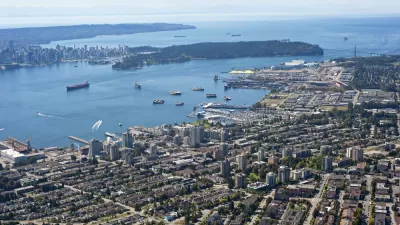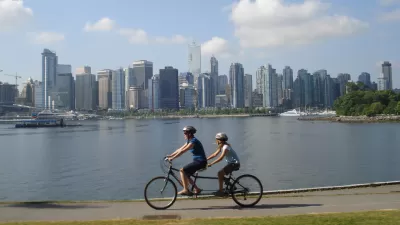The trends in the Vancouver housing market have reverted back to normal, after a foreign buyers tax that went into effect in 2016 had an initial effect on parts of the market.

"Metro Vancouver's housing market hasn't substantially improved since a regional 15 per cent foreign buyers tax was implemented in August 2016," reports Justin McElroy. The analysis stands in contrast to initial reports after the new foreign buyers tax went into effect last year.
McElroy is providing analysis of data provided by the Real Estate Board of Greater Vancouver, with commentary provided by a pair of professors from the University of British Columbia's Sauder School of Business.
The analysis takes a wide-ranging approach to the data—from home prices (which have crept back up to pre-foreign buyers tax after an initial drop) to apartment prices (which have been consistently growing, despite the tax), suburban prices (where apartment and house prices paused briefly after the law went into effect, but then continued to rise steadily), housing activity (up significantly over 2016), and foreign buyers (increasing steadily after an initial drop following the new tax).
The data seem to make a case that the foreign buyers tax did not solve the fundamental problems of the Vancouver housing market—a case that has also been made this year by Dan Bertolet. In McElroy's article, Tsur Sommerville, a professor at UBC's Sauder School of Business, cautions against over-interpreting the data, but also suggests that Vancouver policy makers might need to target more effective taxes to have an effect on the housing market.
FULL STORY: 5 charts showing Metro Vancouver's affordability has become worse despite the foreign buyers tax

Maui's Vacation Rental Debate Turns Ugly
Verbal attacks, misinformation campaigns and fistfights plague a high-stakes debate to convert thousands of vacation rentals into long-term housing.

Planetizen Federal Action Tracker
A weekly monitor of how Trump’s orders and actions are impacting planners and planning in America.

In Urban Planning, AI Prompting Could be the New Design Thinking
Creativity has long been key to great urban design. What if we see AI as our new creative partner?

How Trump's HUD Budget Proposal Would Harm Homelessness Response
Experts say the change to the HUD budget would make it more difficult to identify people who are homeless and connect them with services, and to prevent homelessness.

The Vast Potential of the Right-of-Way
One writer argues that the space between two building faces is the most important element of the built environment.

Florida Seniors Face Rising Homelessness Risk
High housing costs are pushing more seniors, many of them on a fixed income, into homelessness.
Urban Design for Planners 1: Software Tools
This six-course series explores essential urban design concepts using open source software and equips planners with the tools they need to participate fully in the urban design process.
Planning for Universal Design
Learn the tools for implementing Universal Design in planning regulations.
Gallatin County Department of Planning & Community Development
Heyer Gruel & Associates PA
JM Goldson LLC
City of Camden Redevelopment Agency
City of Astoria
Transportation Research & Education Center (TREC) at Portland State University
Jefferson Parish Government
Camden Redevelopment Agency
City of Claremont





























